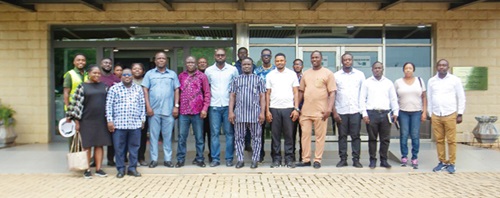The Chairman of Parliament’s Select Committee on Environment, Yaw Frimpong Addo, has said that his bureau will enforce new policies and reform existing legislation to strengthen Ghana’s waste management system.
He said the need for reforms had become necessary following challenges that had hindered the sector’s effectiveness, including insufficient supply of waste collection containers.
Currently, only about 10 per cent of solid waste generated in the country are properly disposed of, with the rest ending up dispersed on the streets, in drains and streams, posing environmental and health risks.
Limited access to information on solid waste management and sanitation by the public is also a major challenge, making waste management largely the exclusive responsibility of local government.
In light of this, the Chairman of the Environment Committee, who is also the Member of Parliament (MP) for Manso Adubia in the Ashanti Region, said it had become imperative for Parliament to make new laws or reform existing ones to make Ghana’s waste management more viable.
Facility tour
Mr Frimpong Addo made these remarks during a tour of Zoomlion Ghana Limited's Integrated Waste Treatment facility in Kumasi, the Ashanti regional capital.
The committee received a briefing on the facility's operations and its contributions to Ghana's environmental narrative during the tour.
After the committee's tour of the facility and learning about its operations, the chairman remarked that "we're discussing among ourselves that one of the recommendations from this meeting is to propose new laws".
He emphasised that these laws would ensure waste segregation before disposal, addressing concerns raised by facility managers during the briefing for the MPs.
“It's something that we are discussing and it will appear in our reports,” he stressed.
The Jospong Group of Companies’ Integrated Waste Treatment facility houses a composting plant, a faecal treatment plant, and a medical waste treatment plant.
Highlighting the benefits of these plants, the General Manager of the Medical Waste Services Limited for Zoomlion, Senam Tengey, explained that the three different plants, aside from ridding the environment of filth and enhancing health, also aided in other domestic spheres for the public.
The composting plant, known as the Kumasi Compost and Recycling Plant, receives municipal solid waste from the various communities within the enclave, particularly the Greater Kumasi Metropolis and its environs, and converts the organic components of the waste into compost, an organic fertiliser, for use in the agricultural industry.
The same plant also recovers recyclables and other materials that are converted into bins and other plastics for re-use.
The Wastewater Treatment Plant, which is also known as the faecal treatment plant, also receives faecal waste from the communities and treats it.
From the treatment, the company can derive what is called a biochar (bio charcoal) as an end product, which can be used for cooking.
Also, the water from the faecal waste is treated to make it usable for other domestic purposes.
“So, it implies that the faecal waste, which used to pollute our environment, is now being used in a profitable manner,” Mr Tengey said.
The Medical Waste Treatment Plant, he said, dealt with hazardous medical waste that made it harmless before their final disposal.
“We all know that waste generated from healthcare facilities is hazardous.
Therefore, it needs to be treated before disposal, otherwise you have children playing with needles and syringes that have been used on HIV and Hepatitis B patients.
“Now, this facility has been set up with ultramodern machines such as microwaves, which have integrated shredders in them.
It's able to destroy all the hazardous medical waste and make it harmless for final disposal,” he explained.

